Yes, Boost Inbox is designed to cater to businesses of all sizes and industries.
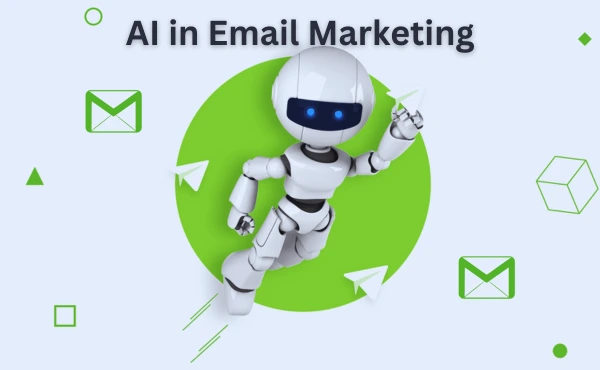
- What is AI in Email Marketing?
- Benefits of AI in Email Marketing
- How to Use AI in Email Marketing
- How AI Improves Automation in Email Marketing
- AI and Personalization: Connecting with Your Audience
- AI in Email Marketing Analytics: Making Data-Driven Decisions
- Creating AI-Driven Email Campaigns
- AI and A/B Testing in Email Marketing
- Challenges and Considerations of Implementing Email Marketing AI
- How Does AI in Email Marketing Improve ROI Over Time?
- The Future of AI in Email Marketing
- Best AI Email Marketing Tools
- Conclusion
Email marketing has long been a trusted way for businesses to connect with their audience, build relationships, and lead sales. But it's more difficult than ever to stand out in the millions of emails that arrive in inboxes every day. Artificial intelligence in email campaigns can change the game in this situation.
AI in email marketing isn’t just a trendy idea; it's changing how companies interact with their customers. Businesses may create communications that genuinely connect by using smart tools and strategies like dynamic content personalization, predictive analytics in email marketing, and personalized email campaigns.
This guide explores how your email efforts can be improved by AI-driven marketing strategies. We'll show the advantages, useful applications of AI, and top AI email marketing software to help you achieve your goals, from increasing email open rates to producing highly personalized content. You'll find practical advice to improve your campaigns and increase your results, regardless of your level of experience in email marketing with AI.
What is AI in Email Marketing?
AI in email marketing refers to the application of intelligent technologies to increase the efficacy of email campaigns. Artificial intelligence in email campaigns can help automate processes, generate targeted campaigns, and optimize customer email delivery rather than doing everything by hand.
AI uses machine learning in email marketing to learn from past email data, which helps it decide what to send and when. For example, it may decide when emails should be sent depending on when recipients are most likely to open them. AI can also help in the development of AI-driven marketing strategies and in creating content that directly addresses the interests and actions of the customer.
Tools like generative AI for emails can even help write engaging subject lines and email content, giving each message a unique and personalized feel. In this way, businesses can connect with their audience in smarter, more effective ways that improve engagement and results.
Benefits of AI in Email Marketing
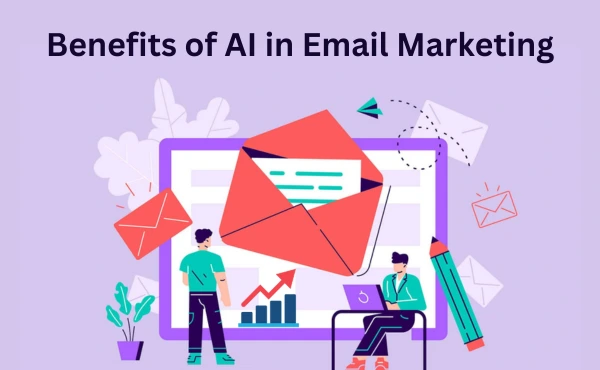
Machine learning email marketing offers numerous advantages that make marketing smarter and more effective. It may help you improve customer engagement, create personalized email campaigns, and deliver the appropriate message at the ideal moment. Your emails will feel more personalized when you use AI-driven marketing strategies, which will improve results and create closer bonds with your audience.
Increased Efficiency
By handling tasks that would typically take a lot of time, AI greatly speeds up and simplifies email marketing. For example, AI-powered email marketing tools can complete tasks like customer segmentation and email performance analysis in a matter of minutes rather than hours. Businesses can perform more productively and concentrate on other important responsibilities as a result.
By automating repetitive tasks, AI helps create streamlined marketing workflows, so marketers can spend more time creating content and connecting with customers. This also leads to reduced marketing costs, AI tools can replace manual labor and minimize the need for as big teams, which also results in lower marketing expenses.
Additionally, scalability in email campaigns becomes easier since AI allows marketers to handle and improve a higher volume of emails without compromising quality. In the end, this increases the effectiveness of email marketing optimization by reducing the work required to contact the appropriate people at the right time.
Improved Accuracy
AI makes sure that your emails are seen by the appropriate recipients and have a greater impact. Based on their interests and actions, AI-based segmentation may split your audience into more specific, smaller groups. This enables you to send extremely relevant and personalized email content.
AI-based email marketing may also identify which customers are most likely to interact with your communications when you use predictive analytics in email marketing, increasing your chances of success. Furthermore, predictive lead scoring enables you to concentrate on the top leads, improving email performance and deliverability, while AI-powered audience profiling with AI helps generate more thorough insights into your audience's needs.
Enhanced Personalization
Email marketing has advanced beyond generic messages thanks to AI. You may now write hyper-personalized email content that addresses each recipient individually. AI can modify email content according to user choices, actions, and previous interactions because of dynamic content personalization.
Emails are more likely to be opened and interacted with when they are sent at the appropriate time thanks to real-time customer personalization. This degree of customization facilitates the development of closer relationships with your audience. Additionally, AI enables AI-enhanced re-engagement emails, which target customers who haven’t interacted in a while, bringing them back with relevant offers and updates.
Better Campaign Insights
Tools with AI capabilities make it simpler to track and understand the effectiveness of your email marketing. Real-time information regarding customer involvement is provided by automated email analytics, which displays which emails are being clicked, opened, and ignored. AI can monitor how users interact with your emails and assist you in identifying trends in their behavior through behavioral data analysis.
Sentiment analysis for email responses examines the opinions whether favorable or unfavorable that individuals have regarding your emails. Audience profiling with AI improves your understanding of your subscribers, and data-driven decisions in email marketing choices let you make smarter campaigns. Additionally, you may remain ahead of the competition by using predictive consumer insights to predict what your audience may want next.
Increased Conversions
AI helps emails function better, which is a major factor in increasing conversions. Businesses may increase the likelihood of a purchase by offering each subscriber the most relevant products using AI-powered product recommendations. AI can attract attention and encourage recipients to read emails by using dynamic promotions and AI-generated subject lines that are generated by the system.
Sending emails at the most convenient times for each individual also helps improve email open rates. By making links in emails attractive, click-through rate optimization increases the number of clicks. Generally, sending emails at the proper time and with content that attracts your readers will conversion rate improvement.
How to Use AI in Email Marketing
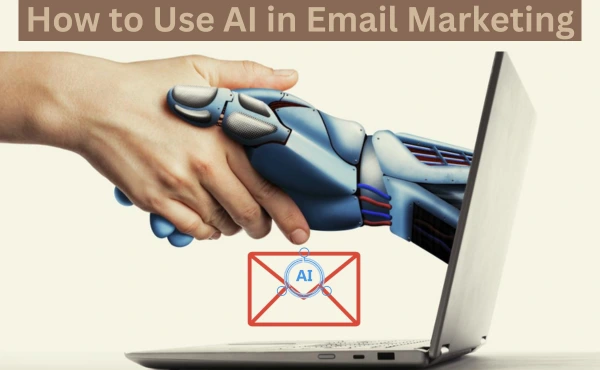
AI offers a lot of useful applications that can improve the effectiveness and understanding of email marketing. AI is capable of handling all tasks, including managing email lists, producing interesting content, and analyzing the effectiveness of campaigns. Let's examine how AI can easily increase customer engagement, and improve targeting and email marketing optimization.
Ideas for Content
It can be challenging to think of original and captivating email content, but AI tools for content optimization help. To recommend ideas that are most likely to be successful, these tools examine popular subjects, the preferences of your audience, and the effectiveness of previous emails.
In just a few minutes, you can produce original and captivating content for generative AI for emails, including memorable subject line optimization and customized messages. Furthermore, AI advancements in creative design improve the look of your emails, increasing their visual appeal for your audience. This guarantees that your emails not only capture the reader's attention but also maintain their interest.
Email Validation
A clean email list is important for success. AI tools simplify list management by identifying inactive or invalid addresses, ensuring better deliverability. Your email lists can be swiftly scanned by AI algorithms to find fake, invalid, or inactive email addresses. Eliminating these addresses guarantees that your emails are received by actual people and improves the level of your marketing.
Your emails are less likely to end up in spam folders as a result of email deliverability improvements. AI lowers bounce rates, helps you keep up a positive sender reputation, and makes sure your email campaigns are as successful as possible by regularly cleansing your lists.
Sending Frequency
The effectiveness of campaigns can be greatly affected by the timing of email campaigns, and AI-driven decision-making in campaigns the need for guesswork. Send-time optimization uses email artificial intelligence (AI) to determine the optimal time to send emails by analyzing subscriber behavior, such as when they typically check their mailbox.
This guarantees that more people interact with your content and increases email open rates. You may also modify sending schedules using real-time data, including shifting time zones or activity patterns, thanks to real-time email optimization. This strategy guarantees that your emails are delivered at the optimal moment to capture interest and motivate action.
Campaign Insights
Improving outcomes requires knowing how effectively your email campaigns are functioning, and automated email analytics make this process quick and easy. These tools provide you with a clear picture of what's working by providing campaign performance metrics, including email open rates, click-through rates, and conversions. You can modify content to better suit readers' preferences by using email engagement insights, which display how they interact with your emails.
AI can even identify future trends, such as which subscribers are most likely to make a purchase, through predictive customer behavior analysis. With the help of these insights, you can optimize your approach and concentrate on activities that produce the best outcomes and return on investment.
Content Creation
Developing excellent email content is important for capturing the reader's interest and maintaining it. AI-generated email subject lines and interesting body content that attracts your audience are just two examples of how generative AI for emails may help. To make sure your emails are visually appealing, these tools can even create responsive email templates that look great on all devices.
Additionally, marketers can create messages that feel thoughtful and personal by using AI and empathetic content creation that responds to readers' wants and emotions. Your email campaigns are more successful, and you establish deeper connections with your audience when you mix creativity and relevancy.
Email List Cleanup
Maintaining a clean email list is important to campaign success. AI can measure how users interact with your emails, including whether they open, click, or ignore them, by using subscriber interaction tracking. This makes it easier to find inactive subscribers who have lost interest, enabling you to delete or reconnect with them.
Furthermore, churn rate prediction tools use artificial intelligence (AI) to identify which subscribers might stop interacting in the future, providing you with an opportunity to regain their attention through customized emails. Better performance, improved deliverability, and the flexibility to concentrate on those who genuinely want to hear from you are all guaranteed by a clean, active email list.
Email Personalization
AI makes it easy to write emails that are unique and feel personal. Personalized email recommendations allow you to provide suggestions for goods, services, or information based on each person's preferences or past interactions. These suggestions are customized to each user's tastes using AI personalization software, which makes emails more interesting and relevant.
To deliver emails with the right content at the appropriate time, behavioral targeting also assists in tracking consumer actions, such as past browsing or purchase history. This degree of customization improves conversions and customer interest, increasing the efficiency and importance of your email messages.
Smart Segmentation
You can quickly classify your audience that is right for your campaigns by using AI-powered email segmentation. Your communications will be more relevant to each individual in these groups, which can be created based on variables like age, hobbies, or purchasing patterns.
For example, geographic segmentation for email helps you reach customers in specific places with local specials or updates, and demographic-based email marketing lets you customize messages to particular age groups or professions. AI is also quite good at purchase pattern analysis, which allows you to offer recommendations in real-time by determining what individuals buy and when. This smart strategy improves results and makes emails more interesting.
Email Automation
AI-powered email marketing automation tools can manage repetitive jobs, increasing the effectiveness and consistency of your campaigns. For example, abandoned cart email strategies automatically remind customers to finish the transaction if they leave things in their cart, boosting conversion rates. Adaptive email marketing strategies, which modify timing and content according to consumer behavior, are also made possible by AI.
Automation makes sure that all communications are timely and important, whether they are follow-ups, re-engagement emails, or exclusive offers. In addition to saving time, this improves campaign performance by allowing marketers to concentrate on innovative planning and strategy.
How AI Improves Automation in Email Marketing
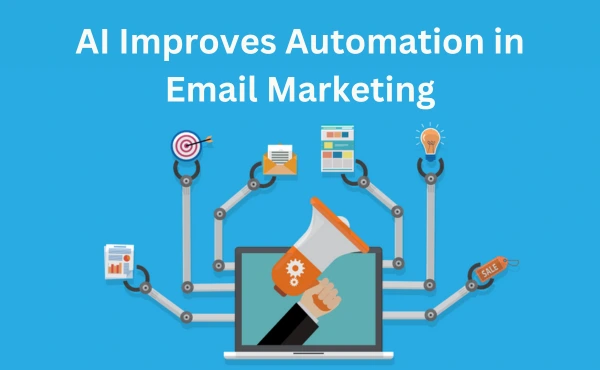
AI email automation takes a whole new level, combining convenience with unmatched accuracy. With CRM integration with AI, your customer data becomes an effective tool for creating highly targeted and relevant email campaigns. For instance, AI can analyze customer behaviors, such as browsing habits or purchase history, to send automated email recommendations that match their interests.
Intelligent email marketing workflows streamline the process further, automatically managing tasks like sending welcome emails, re-engagement messages, or personalized offers without human intervention.
Additionally, by integrating data and automating repetitive processes, AI integration with marketing clouds streamlines intricate email marketing strategies. Large campaigns are easier to manage thanks to this scalability, which guarantees that each subscriber receives timely and relevant communications. With the help of these cutting-edge tools, marketers can produce more intelligent campaigns that instantly adjust to the needs of their target audience while concentrating more on strategy and creativity.
AI and Personalization: Connecting with Your Audience
AI creates messages that genuinely connect with each recipient, bringing personalized email campaigns to life. To provide targeted email content that seems recent and relevant, it analyzes data including consumer behavior, past purchases, and preferences. AI-powered retargeting email strategies, for example, may send a follow-up email with a discount to a subscriber who is online shopping.
Whether it's a welcome email, a purchase confirmation, or a re-engagement offer, AI also helps lifecycle email campaigns, making sure that customers receive the right communications at various points in their journey. Furthermore, it generates personalized promotional emails based on particular customer preferences, which improves conversion rates.
In addition to increasing happiness, this hyper-targeted strategy creates trust and enduring loyalty. Businesses can improve customer retention and establish deep relationships with their audience by using AI's capacity to understand what the customer wants.
AI in Email Marketing Analytics: Making Data-Driven Decisions

AI-powered email analytics transform raw campaign data into valuable insights, helping marketers identify what works and what doesn’t. AI makes it possible to implement more intelligent and successful strategies by revealing hidden patterns. Predictive modeling in marketing, for example, predicts when customers are most likely to open emails or make purchases.
Marketers may send customized re-engagement emails by using AI to identify subscribers who are in danger of disengaging with technologies like churn rate prediction. It may conduct sentiment analysis for email responses, examining how customers interpret your communications in light of their exchanges.
AI also provides real-time customer behavior tracking, allowing you to know what your audience is doing in real-time. You can quickly modify your strategy with the help of this real-time data. Anomaly detection in campaigns keeps your campaigns on course by warning you of odd patterns, including a sharp decline in open rates.
These insights increase performance and return on investment by enabling marketers to make data-driven marketing decisions in email marketing.
Creating AI-Driven Email Campaigns
Developing AI-driven marketing strategies involves combining clever tools with innovative approaches to produce effective email campaigns. Using dynamic promotions in email campaigns, where offers change in real-time based on consumer preferences or behavior, is one efficient way to make emails more appealing and relevant.
Whether your subscribers view your emails on a desktop, tablet, or smartphone, you can make sure they look great on all of these platforms by using responsive email templates. Predictive modeling in marketing, which helps you expect consumer actions like clicks or purchases and adjust campaigns appropriately, is also powered by AI.
Furthermore, your campaigns may be instantaneously updated in response to shifting consumer behaviors thanks to AI and real-time email adaption, guaranteeing that the appropriate information reaches the correct target at the right time. These tools enable AI-driven decision-making in campaigns, optimizing timing, content, and targeting for better results. Together, these strategies make your emails more engaging, personalized, and effective.
AI and A/B Testing in Email Marketing
A key component of successful email campaigns is testing. You can quickly test several subject lines, graphics, and calls-to-action (CTAs) to determine which ones your audience responds to best using AI-powered A/B testing. AI speeds up the process and analyzes outcomes in real time, in contrast to traditional approaches.
AI-driven subject line testing is an important tool that assists you in creating attention-grabbing headlines that increase open rates. To track how subscribers respond to your emails, AI additionally allows engagement rate monitoring. Email response forecasting also makes sure your campaigns remain relevant by predicting future trends based on past results.
With anomaly detection in campaigns, AI to identify unusual performance trends, such as sudden declines in engagement, so you can take quick action to fix problems. These technologies let you continuously improve and get better outcomes by making testing more intelligent and effective.
Challenges and Considerations of Implementing Email Marketing AI

While there are many benefits to using AI in email marketing, there are also a few disadvantages that companies should think about before implementing it. The following are some of the main points:
Dependence on Customer Data
AI functions best when it has a large amount of data to analyze. This means that to get accurate findings, companies must collect a significant amount of first-party data collection. To ensure that the customer's privacy is maintained, the data must be collected responsibly and ethically.
Data Privacy in Email Marketing
Privacy issues arise because AI uses a lot of data. Businesses need to be mindful of data privacy in email marketing as additional regulations related to AI-driven marketing are developed. They have to conform to regulations and safeguard personal data.
Transparency in AI Models
Companies need to show transparency in AI models as AI plays a bigger role in marketing. Investors and customers must be aware of how AI makes judgments and make sure it is applied equally.
AI Integration Challenges
Businesses may find it challenging to implement AI. Connecting AI technologies with current workflows and systems can provide integration issues. This could take a lot of time and money to complete.
Training Teams for AI Adoption
Teams inside the organization have to understand the principles of artificial intelligence and know how to apply it efficiently. An important first step in ensuring the success of AI tools in marketing is preparing teams for AI adoption.
AI Limitations in Personalization
Although AI is excellent at customizing content, it is not always able to fully understand hidden actions or complicated human emotions. This indicates that there are still AI personalization limitations.
Building Trust in AI Systems
The team must have faith in AI for it to function well. For the adoption and use of AI systems to go smoothly, trust must be built.
Ensuring Data Security in AI Marketing
To avoid leaks or incidents, companies must prioritize data security in AI marketing in addition to data privacy.
Regulations on AI-Driven Marketing
Stricter laws and regulations are being put in place around AI-driven marketing. To make sure their AI efforts are compliant, marketers must stay current.
Businesses can successfully integrate AI into their email marketing strategy while maintaining compliance and gaining the trust of their customers by addressing these issues.
How Does AI in Email Marketing Improve ROI Over Time?
By improving each phase of your campaigns, AI in email marketing greatly increases ROI improvement with AI. Using tools like customer journey mapping and behavioral email targeting to better understand your audience is the first step. By using such tools, you can increase engagement and boost conversions by sending the correct message to the right person at the right time.
AI-powered conversion rate optimization tools use past campaign data to predict customer behavior and optimize email content for increased open and click-through rates. AI assists marketers in concentrating on the most successful strategies, which results in improvements over time.
AI creates streamlined marketing workflows by automating routine tasks like performance monitoring and segmentation. This reduces expenses and saves time, enabling you to more efficiently use resources.
AI ensures continuous profitability growth while improving email marketing success through its capacity to optimize content, timing, and targeting.
AI-powered email marketing can deliver:
- 14-20% increase in open rates
- 10-15% higher click-through rates
- Up to 30% improvement in conversion efficiency
The Future of AI in Email Marketing
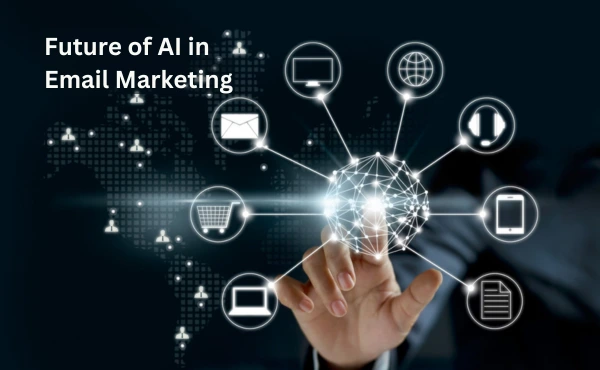
AI developments in creative design, predictive analytics, and real-time changes will influence email marketing in the future. These developments will improve the intelligence, speed, and engagement of email campaigns. Hyper-personalized emails that quickly adjust to a recipient's activity and preferences are among the Future trends in email marketing, guaranteeing that each communication feels unique.
Businesses of all sizes can employ neural network applications in marketing to evaluate massive volumes of data as modern AI tools for marketers become more accessible and reasonably priced. They will be able to better forecast consumer behavior and enhance campaign effectiveness as a result.
Additionally, AI will encourage creativity, allowing marketers to create eye-catching emails that connect with their target consumers. AI advancements in creative design will make things like choosing images, creating content, and creating subject lines easier.
AI is a key component of effective email marketing strategies since the future holds a combination of automation, personalization, and innovation.
Future AI and Email Marketing Innovations:
- Generative AI for hyper-personalized content
- Natural Language Processing for Sentiment Analysis
- Machine learning for email marketing to predictive customer journey mapping
- Real-time content adaptation using neural networks
Best AI Email Marketing Tools
Here are some amazing email marketing AI tools that make email marketing easier, smarter, and faster:
HubSpot AI Tools: HubSpot Provides AI-assisted email content generation, predictive lead scoring, and performance analytics. Verified features include:
- AI-powered content suggestions
- Automated email personalization
- Real-time campaign performance tracking
360 Marketing Tool: 360 Marketing Tool is an all-in-one platform that uses AI to create better email strategies. It helps target the right audience and boost engagement.
SendGrid: SendGrid Email delivery platform with AI-enhanced features:
- Predictive send-time optimization
- Automated list segmentation
- Advanced deliverability insights
GetResponse: The GetResponse platform uses AI for email automation, audience segmentation, and smart analytics to help you reach more people.
ChatGPT: ChatGPT helps write clear, engaging email content and saves time on brainstorming.
Zapier: Zapier connects apps to automate email tasks and workflows, making your work smoother.
Grammarly: Grammarly uses AI to check grammar, tone, and spelling so your emails look polished and professional.
These tools can help you create better emails, save time, and grow your audience with the power of AI.
Conclusion
AI in email marketing is the way of the future for audience engagement, not just a fad. AI is transforming email marketing in several ways, from increasing efficiency and personalization to providing insightful data that can be put to use. Adopting AI-driven decision-making allows you to develop more intelligent tactics that improve ROI, engagement, and conversions.
AI tools for email marketing can create countless options to make your campaigns effective, whether it's through predictive customer insights, dynamic promotion creation, or AI-powered email segmentation. Investigate AI tools now to improve your email marketing strategy. Ready to enhance your email marketing with AI? Start implementing these strategies today and measure your results. Are you prepared to advance your email marketing campaign? Take a look at Boost Inbox Blogs now to find out more and get going.
What to read next
Absolutely! Boost Inbox is compatible with most major email service providers.
The warmup process duration may vary depending on your email volume, but it typically ranges from a few days to a couple of weeks.
Yes, Boost Inbox offers dedicated customer support to assist you throughout the warmup process.
While it's possible, it's best to start the warmup process from the beginning with Boost Inbox for optimal results.
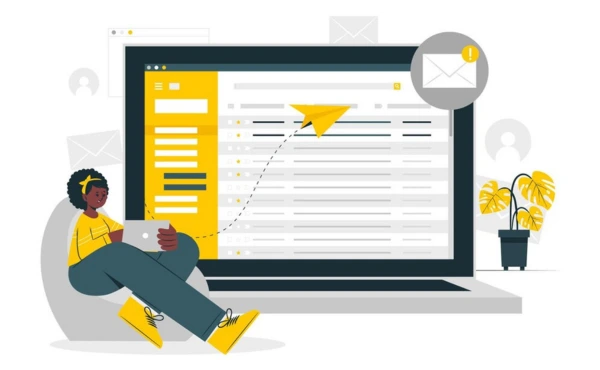
.webp)